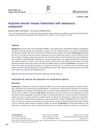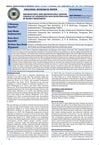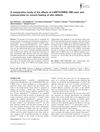 October 2023 in “International journal of science and research”
October 2023 in “International journal of science and research” Ayurvedic treatments can effectively regrow hair in Alopecia Areata without side effects.
 February 2023 in “Asian journal of pharmaceutical research and development”
February 2023 in “Asian journal of pharmaceutical research and development” Flavonoids in Iraqi marshland plants have potential health benefits like antioxidant and anti-inflammatory effects.
 January 2023 in “International journal of biological sciences”
January 2023 in “International journal of biological sciences” COX2 and ATP synthase control the size of hedgehog spines.
 January 2023 in “International Journal of Zoological Investigations”
January 2023 in “International Journal of Zoological Investigations” Certain genetic variations in IL-16 may increase the risk of alopecia areata.
 December 2022 in “Exploratory animal and medical research”
December 2022 in “Exploratory animal and medical research” The study concluded that Acral lick dermatitis is most common in young male Labrador retrievers, often caused by psychological factors, and leads to skin inflammation and stress-related blood changes.
 October 2022 in “Boletín médico del Hospital infantil de México/Boletín médico del Hospital Infantil de México”
October 2022 in “Boletín médico del Hospital infantil de México/Boletín médico del Hospital Infantil de México” The patient has a rare skin condition that shows features of two known disorders.
 August 2022 in “Revista de la Universidad Industrial de Santander/Salud UIS”
August 2022 in “Revista de la Universidad Industrial de Santander/Salud UIS” Stress-related hair loss was reversed with a special medication.
 November 2021 in “PARIPEX INDIAN JOURNAL OF RESEARCH”
November 2021 in “PARIPEX INDIAN JOURNAL OF RESEARCH” Trigona honey effectively treats dermatitis in dogs.
 June 2021 in “International Journal of Ayurvedic Medicine”
June 2021 in “International Journal of Ayurvedic Medicine” Phytoconstituents from Cyperus Rotundus may help treat hirsutism by interacting with the 5 α reductase enzyme.
 April 2021 in “Journal of Investigative Dermatology”
April 2021 in “Journal of Investigative Dermatology” Photobiomodulation therapy may help treat hair loss in people with darker skin, but more research is needed.
 January 2021 in “Advances in health sciences research/Advances in Health Sciences Research”
January 2021 in “Advances in health sciences research/Advances in Health Sciences Research” Two siblings with gray patch tinea capitis were successfully treated after identifying risk factors.
 October 2020 in “International journal of Ayurvedic medicine”
October 2020 in “International journal of Ayurvedic medicine” Leech therapy and Ayurvedic treatment can effectively regrow hair in recent Alopecia areata cases.

Human hair keratins can self-assemble and support cell growth, useful for biomedical applications.
 May 2019 in “Asian Journal of Pharmaceutical and Clinical Research”
May 2019 in “Asian Journal of Pharmaceutical and Clinical Research” Eclipta prostrata, particularly its chloroform fraction, effectively reduces inflammation and arthritis.
 April 2019 in “International research journal of pharmacy”
April 2019 in “International research journal of pharmacy” Adiantum capillus extract reduces pain and swelling in animals.
 March 2019 in “Journal of Investigative Dermatology”
March 2019 in “Journal of Investigative Dermatology” Seborrheic dermatitis is influenced by diet, genetics, and psychological factors.
 December 2018 in “IntechOpen eBooks”
December 2018 in “IntechOpen eBooks” Neurohormones help control skin health and could treat skin disorders.
 July 2018 in “British Journal of Dermatology”
July 2018 in “British Journal of Dermatology” Mindfulness reduces anxiety and depression in skin disease patients; dermatologists and psychiatrists often lack confidence in treating psychodermatological conditions.

Botulinum toxin type A significantly reduces scalp psoriasis severity compared to placebo.
 December 2017 in “Springer eBooks”
December 2017 in “Springer eBooks” Transplant patients often get skin problems, with treatments varying by condition.
 November 2017 in “Asian journal of pharmaceutical and clinical research”
November 2017 in “Asian journal of pharmaceutical and clinical research” Three compounds from Dadap leaves may help treat hair loss.
 December 2016 in “Journal of evolution of medical and dental sciences”
December 2016 in “Journal of evolution of medical and dental sciences” Skin problems are common in thyroid disorders, with dry skin in hypothyroidism and warm, soft skin in hyperthyroidism.

Benign skin tumors need accurate diagnosis to ensure proper treatment.
 October 2016 in “Elsevier eBooks”
October 2016 in “Elsevier eBooks” Common noncancerous skin diseases have various treatments, including topical applications, light therapy, surgery, and medications, with psychological support being important.
 June 2016 in “CRC Press eBooks”
June 2016 in “CRC Press eBooks” Sleep problems and skin issues affect each other; poor sleep can worsen skin conditions, and some skin treatments can improve or harm sleep quality.
 February 2015 in “Journal of Biomedical Materials Research Part B: Applied Biomaterials”
February 2015 in “Journal of Biomedical Materials Research Part B: Applied Biomaterials” 4-META resin heals skin wounds faster and better than cyanoacrylate.

Any medication can cause skin reactions, some due to allergies and others due to dosage or genetic factors.
 August 2013 in “Actas Dermo-Sifiliográficas”
August 2013 in “Actas Dermo-Sifiliográficas” Most Cochrane Skin Group reviews are helpful for improving dermatology practices, but some lack enough evidence for clinical recommendations.

Use the least toxic, most specific treatments for skin diseases, considering side effects and individual patient needs.
 March 2010 in “Anti-inflammatory & anti-allergy agents in medicinal chemistry”
March 2010 in “Anti-inflammatory & anti-allergy agents in medicinal chemistry” Biologic agents can be effective for rheumatic diseases but have risks like infections and require careful monitoring and patient information.






























